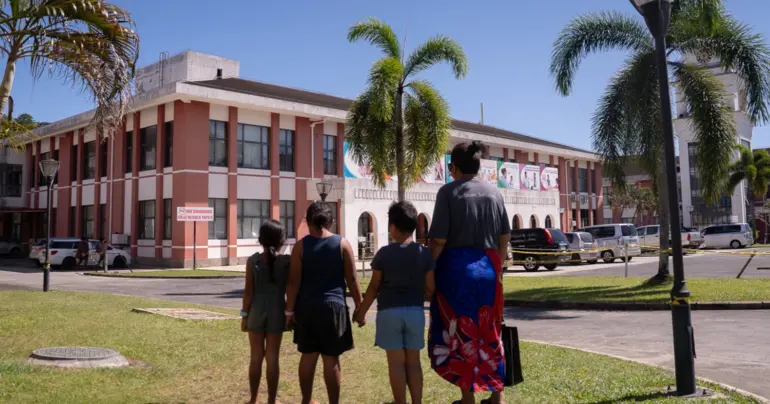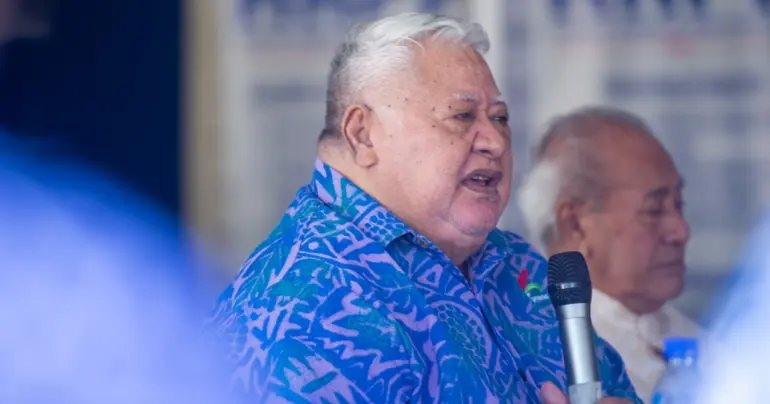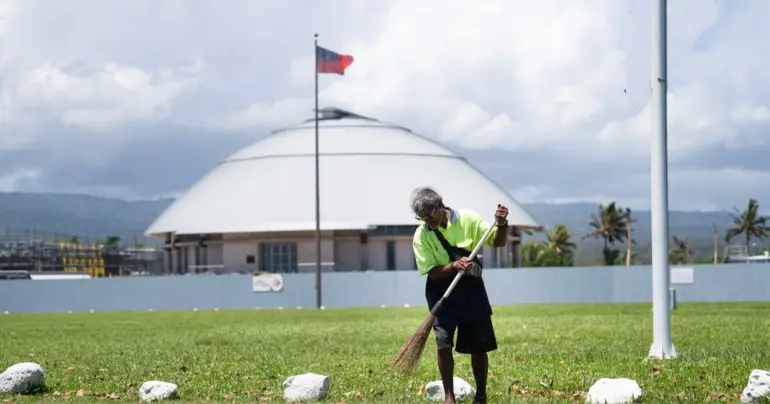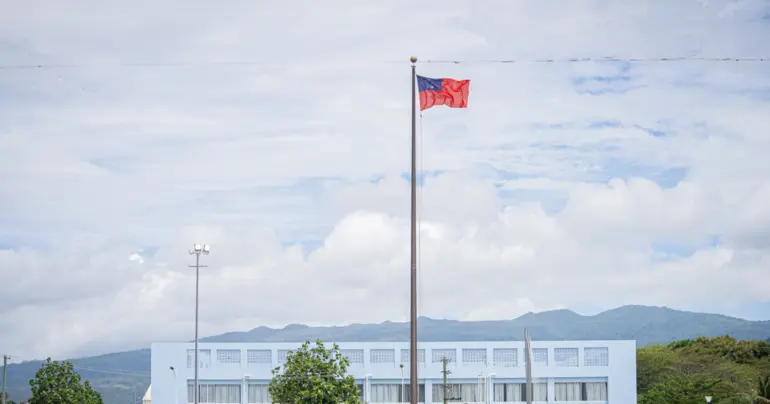'Japan is not throwing trash in your backyard'
Dear Editorial Board of Samoa Observer,
In your editorial titled “No friend throws trash in your backyard” on 14 February 2023, you stated, “…any contamination of the mass of sea could only spell doom for Samoans as a living people and a nation. It is the same risk that our Pacific cousins in neighboring island nations face – if Japan is allowed to dump over a million tonnes of radioactive wastewater into the Pacific.”
I naturally understand the concerns and feelings that ordinary citizens have when they hear the words like “nuclear” or “radioactive substance”, especially those citizens living in the Pacific region who experienced the negative impact of nuclear bomb tests. Japan itself is the only country to have suffered atomic bombings in the world and my late mother was injured by the atomic bomb explosion in Nagasaki when she was a twelve year old girl.
I am writing this letter to state that the Government of Japan will never discharge “contaminated water” that doesn’t meet regulatory standards into the sea, and to explain what Japan plans to do in relation to the discharge of water in Fukushima Daiichi Nuclear Power Station (FDNPS), which was damaged by the tsunami attack in 2011, so that you and your readers are well informed and equipped with correct knowledge based on the scientific evidence that the discharge will not be allowed in a manner that affects human health and the environment of Samoa and any other Pacific nations, including Japan. This is the commitment that has been consistently made by the Government of Japan from the outset, and recently reiterated by Prime Minister Kishida during a meeting with the delegation of the PIF earlier this month.
The following description is based on the information provided to the public by Japan and International Atomic Energy Agency (IAEA). For those who wish to acquire more information, please conduct Internet search by keyword “ALPS treated water” on Google or on YouTube yourself. You can find plenty of materials.
In March 2011, north eastern coasts of Japan were hit by a giant tsunami, and it damaged nuclear power reactors of FDNPS. As a result, cooling water as well as ground water surrounding FDNPS reactors became contaminated by various radioactive substances.
In order to remove dangerous substances from the contaminated water, Japan developed a system called “Advanced Liquid Processing System (ALPS)”. Tons of contaminated water have been treated through the ALPS system and stored in tanks in the premises of FDNPS as “ALPS treated water.”
The number of tanks containing ALPS treated water now exceeds one thousand and is causing difficulties in the decommissioning process of the reactors. Enormous numbers of tanks present psychological pressure to the local residents, who are striving to revitalize the damaged community, and the space for tanks in the FDNPS premises is running out. There is also a danger of water leakage from the tanks by future earthquakes or other natural disasters. In order to alleviate this situation, after more than six years of expert discussion, Japan decided to release the water to its coastal area, after taking thorough studies and procedure to ensure that the quality of water will meet all national and international standards. The discharge of the water into the sea has been, is, and will be vigorously monitored not only by national authorities but also by the IAEA.
Basic information on the discharge
(1) When? On the condition that all the safety requirements are satisfied, Spring-Summer 2023, but not earlier than the publication of IAEA final report on this issue.
(2) Where? Coastal waters about one kilometer from the FDNP in the north eastern Japan.
(3) What? ALPS treated water, not “contaminated water”, “nuclear waste” or “trash”.
Before the discharge, the content of the water is scientifically measured to ensure that the amount of radioactive substances is below national and international standards. If the water does not meet the required standards, it will be reprocessed until it satisfies all the requirements. Monitoring will be conducted for the sea waters surrounding the releasing point throughout the discharge process. If any abnormalities are found, discharge will be immediately stopped before being discharged into the sea.
Several things to know
(1) Tritium: Most radioactive substances contained in the contaminated water can be removed by ALPS treatment to negligible levels, except a substance called “tritium”, which cannot be removed by the system.
Tritium is a kind of hydrogen. Usual hydrogen atom nucleus consists of one proton, whereas tritium atom nucleus is formed by one proton and two neutrons. Since the electrical charge of a nucleus of an atom is decided by the number of protons in it, chemical characteristics of usual hydrogen and tritium are identical.
You can ignore the above description if you hate chemistry or physics, but the basic point is tritium forms a water molecule H2O (or HTO, to be more correct).
Another point I would like to stress is the fact that tritium atoms exist in natural environment, produced by the interaction between cosmic rays and earth atmosphere. You can find tritium in the seawater of Apia Bay, Lalomanu Beach or Vaisigano river or wherever you wish to swim, or in mineral water, Taula beer or red or white wines or whisky you drink. Of course the density level of tritium in these waters or drinks is extremely low and cause no trouble to our health. We call it “background level”.
(2) Background level: I stated above that the ALPS treated water will be discharged in the sea about one kilometer from the Japanese coast.
It is estimated, and will be vigorously monitored and verified once the process begins, that the tritium level of seawater will remain at background level if you are two to three kilometers away from the releasing point. That means the background level of South Pacific waters will never in any case be affected by the discharge. Samoa’s seas, rivers, lakes and drinks will be as safe as they are now, as far as tritium is concerned. All our ancestors lived with tritium, as we all do now.
(3) Tritium is presently discharged by nuclear facilities of other countries.
Nuclear power plants in several countries or areas are releasing tritium-containing-water every day into sea, including the Pacific Ocean. The releasing procedure is strictly controlled by national standards and international IAEA standards to ensure the safety of the discharged water. The names of countries and the level of tritium they are discharging can be found in various materials, including those on the Internet, for example an entry in the Wikipedia under “tritium.” The annual amount of tritium in the ALPS treated water to be discharged will be smaller than the amount being presently discharged by many nuclear power plants of these countries.
(4) Japan has been trying to be transparent and offering all relevant information.
Concerning the discharging of ALPS treated water, Japan has been conducting thorough study of the situation, considering in detail several possible options for the discharge, and has been providing all relevant information to the public and international community through briefing sessions for national and international reporters and diplomats, discussion with scientific experts, and posting of many materials on the Internet. Everyone can obtain relevant information through Internet searches. In addition, in response to the concerns of Pacific Island countries, five briefings to the Pacific Island countries/regions and four briefings to the Secretariat and experts have been held.
Main takeaways from this message
(1) We are not “dumping” contaminated water.
According to the Oxford Dictionary of English, “to dump” means “deposit or dispose (rubbish, waste, or unwanted material), typically in a careless or hurried way.” As I described above, Japan is taking very careful and long process to ensure the safety of the water. The word “dump” does not apply to our case.
(2) We are not dumping “contaminated water” or “trash”.
Also, as stated above, ALPS treated water is not contaminated water or trash, but complies with regulatory standards based on international standards.
(3) Tritium exists in natural environment.
Tritium is found everywhere in the world as part of water molecules. You are surrounded by some amount of tritium atoms even now as you read this message. The important issue is not whether tritium is contained or not, but its density. Discharge of ALPS treated water in Japan will not in any way affect the present natural density of tritium in Samoa, or the Pacific, or even in Japan.
(4) Other countries are discharging tritium-containing-water every day.
Discharge of ALPS treated water will not significantly change the total amount of tritium being discharged at present from various nuclear power plants in several countries.
(5) Japan is conducting this process in full compliance with national and international regulations, while continuing to undergo review by the IAEA, the sole international organization responsible for monitoring the safe use of atomic energy.
(6) You can find a lot of materials or videos on this subject on the Internet.
Finally, I would like to point out that local residents of Fukushima, fishermen, farmers and other people, are making every effort to overcome the negative impact of the tragic tsunami disaster. I would like to seek the understanding of their Pacific counterparts that they will suffer secondary damages caused by a false understanding and harmful rumors. In this regard, it is encouraging that President Panuelo of the Federated States of Micronesia, during the meeting with Prime Minister Kishida on February 2nd, acknowledged the efforts of Japan and expressed that the FSM is no longer as fearful or concerned as before with deep trust in Japan’s intentions and technical capabilities.
Japan has been always ready to do the utmost to garner understandings of the region including Samoa.
Senta Keisuke
Ambassador of Japan to the Independent State of Samoa











